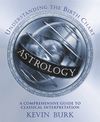Using Astrology to See the World in a New Way

Writing a book, I discovered, is like pulling a loose thread on a cold day. You can see the thread of an idea, dangling and inviting, so you pull it. The thread doesn't break but instead begins to unravel a knit cap, a scarf, a sweater, until finally your garments are just a pile of thread on the floor and you are standing there, shivering. So you pick up a word needle, thread it with one of the ideas that now lay strewn about, and begin to sew. I wrote a book to stay warm.
A type of astrology that focuses on the outside world rather than the individual is called mundane astrology. The word "mundane" is derived from mundus, meaning "the world," which was a Latin translation of the Greek word for "cosmos," or orderly arrangement. I always felt that this type of astrology was tremendously stimulating (although the word mundane suggests otherwise) and I wanted to write a book which made the "astrology of the world" come alive and speak to readers in interesting, relevant ways—especially in our uncertain times.
Cosmic Trends evolved and changed before my eyes. From the simple thread with which I began, the book became a colorful fabric. As I wrote, stitching together some of my ideas, I focused initially on producing a book of astrological forecasts and predictions, with particular emphasis on Pluto's upcoming entry into Capricorn. I quickly realized that a couple of things were missing in this approach. First, if I wrote about Pluto, some readers might not be aware of that planet's meaning in astrology. And if I wrote about Capricorn, it might be helpful to include background information about that sign and its ruler, Saturn.
I had to take a few steps back and lay the foundation for all readers—no matter how experienced in astrology—so they could follow along and connect with the book's astrology forecasts. Therefore, as I wrote Cosmic Trends I included chapters explaining some of the zodiac signs and their modern ruling planets: Capricorn and Saturn, Scorpio and Pluto, Pisces and Neptune, and Aquarius and Uranus.
In addition, I wrote a chapter on Pluto generations, from Pluto in Cancer up through the present Pluto in Sagittarius. In these chapters, and throughout the book as a whole, I tried to show how deeply and inclusively our world is connected to the meanings of the planets and zodiac signs. Cosmic Trends shows how literature, popular television shows, movies, fashion trends, cars, art movements, and a myriad of different cultural trends—both high and low—are all connected to the cyclic movement of the outer planets.
I also wanted Cosmic Trends to acknowledge the importance and relevance of traditional astrology—astrology as it was practiced before the outer planets were discovered and incorporated into the celestial arts. Woven into the book is some background on Jupiter as the traditional planet ruler of Pisces and Saturn as the traditional ruler of Aquarius.
The Jupiter-Saturn conjunction was a widely used predictive method in traditional astrology. My chapter on this important astrological forecasting tool includes a look ahead to the dramatic, rare and transforming Mutation Conjunction that we will fully experience in 2020. The Mutation Conjunction (also known as a Grand Mutation) occurs approximately every two hundred years when the Jupiter-Saturn conjunction changes elements. That is, the conjunction changes from being in, say, earth signs for two hundred years to being in air signs—a change we are starting to undergo.
Another thing I felt I needed to do was to humanize the book, to connect it to individuals. After all, what good is a book on cosmic connections if people can't feel like part of the connection? I began to look for well-known individuals I admired and who were connected to some of the planets and planetary patterns I was describing in my book. Nelson Mandela, for example, has a powerful Uranus—the freedom planet—so I wrote about him in my chapter on Uranus. Learning about the individuals in my book, so that I could write about them myself, was a wonderful, personally enriching experience.
Readers, I felt, also need to be able to use astrology to reflect on our world creatively and personally. I decided to include Astro-Connection Activities to help awaken the intuitive, synthesizing right brain—your inner forecaster. Cosmic Trends has creative journaling activities; stimulating astrology worksheets to help spot trends in movies, television, and fashion; graphic organizers to enable you to make connections and visualize the planetary energies in our world; and a poem-writing exercise to help you open up and feel the cosmic energies of planets and signs. These interactive, creative astrology exercises will help you to transform the way you see the world.
The symbols of astrology are all around us. To be able to see—and intuitively understand—the connected fabric of cosmic influences in our world is both exciting and empowering.
Related Products

is subject to certain Terms and Conditions